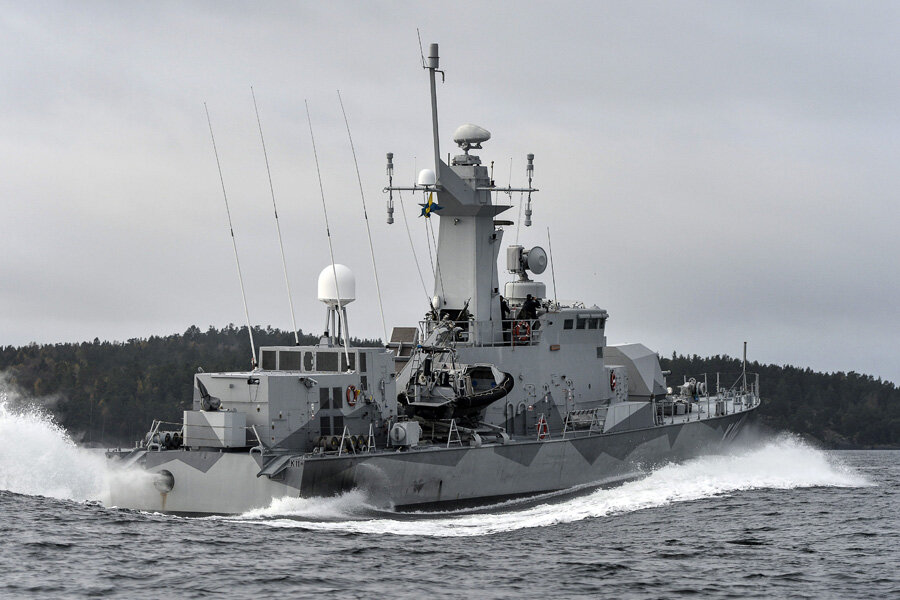Sweden's search for unidentified sub causes concern around Baltics
Loading...
| Stockholm
Sweden's biggest submarine hunt since the dying days of the Soviet Union has put countries around the Baltic Sea on edge.
In a scene reminiscent of the Cold War, Swedish naval ships, helicopters and ground troops combed the Stockholm archipelago for a fourth day Monday for signs of a foreign submarine or smaller underwater craft that officials suspect entered Swedish waters illegally.
While Sweden hasn't linked any country to the suspected intrusion — and Moscow denies involvement blaming a Dutch submarine — the incident sent a chill through the Baltic Sea region, where Russian forces have been accused of a series of border violations on land, sea and air in recent months.
"Closely following events in the Swedish territorial waters, may become a game changer of the security in the whole Baltic Sea region," Latvian Foreign Minister Edgars Rinkevics wrote on Twitter.
Swedish military officials say there have been three sightings of the elusive craft since Friday, just 40 kilometers (25 miles) west of Stockholm amid the myriad of islands and skerries that stretch from the capital into the Baltic Sea.
On Sunday they released a photograph taken at a distance of what they said could be the mystery vessel — a dark speck surrounded by foaming water.
Military spokesman Jesper Tengroth said more than 200 personnel were involved in the operation, but stressed that unlike Sweden's submarine hunts in the 1980s, the military wasn't using depth charges or other anti-submarine weapons.
Speculating on whether the suspected underwater intruder was linked to a mother ship, Swedish media zeroed in on an oil tanker owned by Russian company Novoship, which had been circling near Swedish waters. In a statement Monday, Novoship President Yuri Tsvetkov said he was "flattered" by the attention but said the ship was charted for transporting oil from Russia to the U.S. and was drifting on standby awaiting loading orders.
Daily Svenska Dagbladet has reported that Swedish intelligence picked up distress signals suggesting a Russian mini-submarine had run into trouble in Swedish waters and could be damaged.
Countering such claims, a Russian Defense Ministry official quoted by the Tass news agency suggested that the search was triggered by a Dutch submarine that participated in an exercise with the Swedish navy last week. The unidentified official suggested Sweden should save "taxpayers' money" and ask the Netherlands for an explanation.
The Dutch navy, in turn, said that submarine left Sweden on Thursday and had been in Estonia since early Friday. In Sweden, Armed Forces spokesman Philip Simon said the Dutch submarine was not what triggered the Swedish search.
In the final decade of the Cold War, Sweden launched a series of unsuccessful submarine hunts after a Soviet sub carrying nuclear weapons was stranded off its southeastern coast in 1981.
The events in the past days have sparked alarm across the Baltic Sea in Estonia, Latvia and Lithuania — three small former Soviet republics already spooked by Russia's intervention in Ukraine.
Estonia stepped up surveillance of its territorial waters, with the border guard looking out for "potential anomalies," spokesman Priit Parkna said.
Lithuanians were concerned over the safety of a floating natural gas import terminal currently being transported on the Baltic Sea to the Lithuanian port of Klaipeda. The terminal will be key to Lithuania's plans to reduce its reliance on Russian energy.
Meanwhile, Russian media suggested the Swedes were overreacting. The Nezavisimaya Gazeta newspaper even speculated that the submarine hunt could be a ploy by the Swedish military to boost its defense budget, which has undergone a series of cuts since the Cold War.
The official government newspaper Rossiiskaya Gazeta questioned whether there was any submarine at all, noting the Swedes hadn't found anything.
"Either Sweden's echo location equipment is working badly or, as the old saying goes, the eyes of fear see danger everywhere," the paper said.
The submarine scare in Sweden comes after a string of border incidents involving Russian forces that Western analysts say signal Moscow's growing assertiveness in the Baltic Sea region.
Finland's Environment Institute said last week that Russian military ships had twice intercepted one of its research vessels in international waters.
On Sept. 5 an Estonian security service officer was detained on the Russian border — Estonia and Russia disagree on which side of it — and is still in custody in Moscow.
Both Sweden and Finland, which are not NATO members, have reported airspace violations by Russian military aircraft in the past two months. Even when they stay in international airspace, Russian aircraft are conducting more ambitious maneuvers than at any point since the end of the Cold War, Western analysts say. During Easter last year, Russian warplanes exercising over the Baltic Sea appeared to simulate attacks on targets in Sweden, embarrassing the Swedish Air Force which didn't have any jets on standby.
"These are aggressive attack drills where they make a clear statement to their neighbors," said strategic analyst Magnus Christiansson of the Swedish National Defense College.
NATO says Russian airborne military activity in the Baltic region so far this year is two-and-a-half times higher than last year, and the alliance has boosted its own air patrols over tiny members Estonia, Latvia and Lithuania.
However, a submarine sneaking into another country's territorial waters would be much more serious than muscle-flexing maneuvers in the air, Christiansson said. "To have military forces operating secretly on another country's territory, that's something different," he said. "It is a hostile act."







